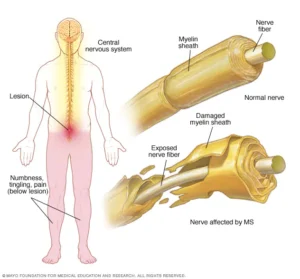What can you suspect if you are feeling Numbness & tired?
The person can feel numbness in hand and feet, blurry vision and fatigue due to multiple reasons like if a person is sitting in one position continuously, he may feel numbness due to lack of blood supply and may also feel blurry vision. These are the very common symptom that every person feel in daily life, but these symptoms can be due to some major disease which can lead to even disability like permanent blindness, unable to walk for a life time. lets discuss why this happen?
MULTIPLE SCLEROSIS:
Multiple sclerosis (MS) is a chronic condition involving your central nervous system (CNS). With MS, your immune system attacks myelin, which is the protective layer around nerve fibers.
MS causes inflammation and temporary lesions. It can also lead to lasting lesions caused by scar tissue, which can make it hard for your brain to send signals to the rest of your body.

Spinal Cord:
spinal cord is a tube-like structure that begins from the end of the brain and ends at the bottom of the backbone.
The spinal cord is made up of nerves that carry information between the brain and the rest of the body.
In MS, the immune system attacks the protective sheath (myelin) that covers nerve fibers and causes communication problems between your brain and the rest of your body. Eventually, the disease can cause permanent damage or deterioration of the nerves.
Types of sclerosis:
There are four types of multiple sclerosis:
Clinically isolated syndrome (CIS):
When someone has a first episode of MS symptoms, healthcare providers often categorise it as CIS, not everyone, who has CIS goes on to develop multiple sclerosis.
Relapsing-remitting MS (RRMS):
This is the most common form of multiple sclerosis. People with RRMS have flare-ups , also called relapse or exacerbation — of new or worsening symptoms. Periods of remission follow (when symptoms stabilize or go away).
Primary progressive MS (PPMS):
People diagnosed with PPMS have symptoms that slowly and gradually worsen without any periods of relapse or remission.
Secondary progressive MS (SPMS):
In many cases, people originally diagnosed with RRMS eventually progress to SPMS. With secondary-progressive multiple sclerosis, you continue to accumulate nerve damage. Your symptoms progressively worsen. While you may still experience some relapses or flares (when symptoms increase), you no longer have periods of remission afterward (when symptoms stabilize or go away).
What are the symptoms of multiple sclerosis?
Multiple sclerosis signs and symptoms may differ greatly from person to person and over the course of the disease, depending on the location of affected nerve fibers.
Symptoms often affect movement, such as:
- Numbness or weakness in one or more limbs that typically occurs on one side of your body at a time, or your legs and trunk.
- Electric-shock sensations that occur with certain neck movements, especially bending the neck forward.
- Tremor, lack of coordination or unsteady gait.
- acute or chronic pain
- cognitive issues involving concentration, memory, and word-finding
- difficulty chewing and swallowing
- sleep issues
- problems with bladder control.
- Slurred speech
- Fatigue
- Dizziness
- Tingling or pain in parts of your body
- Problems with sexual, bowel and bladder function

What are the early signs of MS?
MS can develop all at once, or the symptoms can be so mild that you easily dismiss them. Three of the most common early symptoms of MS are:
Numbness and tingling that affects the arms, legs, or one side of your face.
These sensations are similar to the pins-and-needles feeling you get when your foot falls asleep. However, they occur without a trigger.
Uneven balance and weak legs.
You may find yourself tripping easily while walking or doing some other type of physical activity.
Double vision, blurry vision in one eye, or partial vision loss.
These can be an early indicator of MS. You may also have eye pain.
It isn’t uncommon for these early symptoms to go away only to return later. You may go weeks, months, or even years.
When to see a doctor?
If you feel any symptom of sclerosis, you have difficulty in walking, sleeping and some time even you can’t get up properly or feel tired very early, make a immediate visit to the doctor because any delay can cause you permanent damage, you may not walk move or sleep at all which also disturbs your mental health.
Causes of multiple sclerosis (MS):
Experts still don’t know for sure what causes multiple sclerosis. Research is ongoing to help identify what causes the disease. Factors that may trigger MS include:
Exposure to certain viruses or bacteria:
Some research suggests that being exposed to certain infections (such as Epstein-Barr virus) can trigger MS later in life.
Where you live:
Your environment may play a role in your risk for developing MS. Certain parts of the world have significantly higher rates of the disease than others. Areas farther from the equator have higher rates of MS. That may be because these regions receive less intense sun. People who get less sun have lower levels of vitamin D, a risk factor for developing MS.
How your immune system functions:
Multiple sclerosis is an autoimmune disease. Researchers are working to figure out what causes some people’s immune cells to mistakenly attack healthy cells.
Gene mutations:
Having a family member with MS does increase your risk of the disease. But it’s still unclear exactly how and which genes play a role in triggering multiple sclerosis.
Risk factors:
These factors may increase your risk of developing multiple sclerosis:
- Age. It can occur at any age, but onset usually occurs around 20 and 40 years of age. However, younger and older people can be affected.
- Sex. Women are more than two to three times as likely as men are to have sclerosis.
- Family history. If one of your parents or siblings has had sclerosis you are at higher risk of developing the disease.
- Certain infections. A variety of viruses have been linked to sclerosis, including Epstein-Barr, the virus that causes infections.
- Vitamin D. Having low levels of vitamin D and low exposure to sunlight is associated with a greater risk of sclerosis.
- Certain autoimmune diseases. You have a slightly higher risk of developing sclerosis, if you have other autoimmune disorders such as thyroid disease, anemia, type 1 diabetes or inflammatory bowel disease.
- Smoking. Smokers who experience an initial event of symptoms that may signal sclerosis. They are more likely than nonsmokers to develop a sclerosis,
Complications:
People with multiple sclerosis may also develop:
- Muscle stiffness or spasms
- Paralysis, typically in the legs
- Problems with bladder, bowel or sexual function
- Mental changes, such as forgetfulness or mood swings
- Depression
- Epilepsy
GENERAL HEALTH CARE:
Healthy diet:
The National Multiple Sclerosis Society notes that there’s no special diet for MS, but that eating a diet low in fat and high in vitamins and fiber can help you feel better, while maximizing your energy and supporting healthy bladder and bowel function.
Daily exercise:
Research shows that people with MS who participate in an aerobic exercise program benefit from improved cardiovascular fitness, increased strength, better bladder and bowel function, and a more upbeat attitude.
Yoga exercise are also excellent workouts for people with MS and anyone else, including busy caregivers who can benefit from stress management.
Reach out and get involved.
Self-help and MS support groups can help you connect with other patients and caregivers and establish a valuable network for exchanging ideas, new research news and encouragement.
Address sleep issues:
Be proactive and ask your doctor for help, whether you’re suffering with MS or caring for someone who has it. Chronic illness can be exhausting, and MS patients and their caregivers both need as much quality sleep as they can get.Be proactive and ask your doctor for help, whether you’re suffering with
Author


